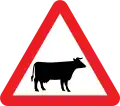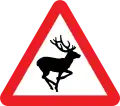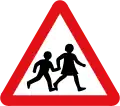Margaret Vivienne Calvert | |
|---|---|
| Born | 12 May 1936 |
| Nationality | British |
| Education | St Paul's Girls' School, London |
| Alma mater | Chelsea College of Arts, London |
| Occupation(s) | Typographer and graphic designer |
| Years active | 1957–present |
| Known for | Design of road signs in the United Kingdom, Crown Dependencies and British Overseas Territories. |
| Notable work | |
| Awards | Officer of the Order of the British Empire |
Margaret Vivienne Calvert[1] OBE RDI (born 1936) is a British typographer and graphic designer who, with colleague Jock Kinneir, designed many of the road signs used throughout the United Kingdom, Crown Dependencies, and British Overseas Territories, as well as the Transport font used on road signs, the Rail Alphabet font used on the British railway system, and an early version of the signs used in airports. The typeface developed by Kinneir and Calvert was further developed into New Transport and used for the single domain GOV.UK website in the United Kingdom.[2]
Early life and education
Born in South Africa, Calvert moved to England in 1950, where she studied at St Paul's Girls' School and the Chelsea College of Art. Kinneir, her tutor there, asked her to help him design the signs for Gatwick Airport. They chose the black on yellow scheme for the signs after researching the most effective combination.[3] They also designed luggage labels for P & O Lines in 1957.[4][5]
Career
In 1957, Kinneir was appointed head of British signs for Britain's roads. He then hired Calvert[6] to redesign the road sign system and she came up with simple, easy-to-understand pictograms, including the signs for 'men at work' (a man digging), 'farm animals' (based on a cow named Patience that lived on a farm near to where she grew up), and 'schoolchildren nearby' (a girl leading a boy by the hand, which she said were actually modelled after herself), using the European protocol of triangular signs for warnings and circles for mandatory restrictions.[7] The Worboys Committee was formed by the British government in July 1963 to review signage on all British roads.
In addition to her road signs, Calvert has designed commercial fonts for Monotype, including the eponymous Calvert font, a slab serif design which she created in 1980. It originated in a 1970s proposal to the French new town of Saint Quentin-en-Yvelines for a new font to provide a visual identity for the town. However, the slab-serif typeface and three-dimensional letter shapes were rejected.[5] The font was later adopted by the Tyne and Wear Metro system as well as north-east England bus and ferry services in the 1980s.[8]
In 2020 a new version of the font used in the UK rail system was introduced, Rail Alphabet 2. It was designed in collaboration with Henrik Kubel.[9]
Calvert taught at the Royal College of Art for almost 40 years and was head of graphics from 1987 to 1991.[5]
Recognition
Calvert was awarded an honorary degree by the University of the Arts London in 2004.[10]
She appeared on the fourteenth season of the famous motoring show, Top Gear on 3 January 2010. James May interviewed her in a 2009 Vauxhall Insignia VXR, talking about the design process of the UK road signs.[11]
She was made a Royal Designer for Industry for Graphic Design in 2011.[12] In 2015, she was presented with the D&AD President's Award.[13]
Calvert was appointed Officer of the Order of the British Empire (OBE) in the 2016 Birthday Honours for services to typography and road safety.[1][14][15]
In June 2018 she was awarded an Honorary Fellowship by Arts University Bournemouth alongside dancer Darcey Bussell, costume designer Jenny Beavan OBE and director and screenwriter Edgar Wright.[16]
A retrospective exhibition of her work, Margaret Calvert: Woman at Work,[9] was held from 21 October 2020 till 10 January 2021 at the Design Museum in London.[5]
Gallery of work
 Transport typeface, used on road signs in the UK and several other countries
Transport typeface, used on road signs in the UK and several other countries Rail Alphabet typeface, used throughout British Rail and formerly the National Health Service in the UK
Rail Alphabet typeface, used throughout British Rail and formerly the National Health Service in the UK Motorway typeface, used for road numbering on UK motorways
Motorway typeface, used for road numbering on UK motorways.jpg.webp)
 Calvert typeface on the Tyne and Wear Metro
Calvert typeface on the Tyne and Wear Metro Roadworks sign used in the UK, one of the pictographic signs designed by Calvert ahead of the 1963 Worboys Review
Roadworks sign used in the UK, one of the pictographic signs designed by Calvert ahead of the 1963 Worboys Review UK road sign warning of farm animals, based on a cow Calvert remembered from her childhood
UK road sign warning of farm animals, based on a cow Calvert remembered from her childhood UK road sign warning of wild animals, inspired by Eadweard Muybridge's photographs of animals in motion.[17]
UK road sign warning of wild animals, inspired by Eadweard Muybridge's photographs of animals in motion.[17] UK road sign warning of schoolchildren, one of the pictographic signs designed by Calvert ahead of the 1963 Worboys Review
UK road sign warning of schoolchildren, one of the pictographic signs designed by Calvert ahead of the 1963 Worboys Review
References
Citations
- 1 2 "Birthday Honours 2016: the Prime Minister's list" (PDF). UK Government. Retrieved 10 June 2016.
- ↑ "A few words on Typography". GDS Blog. Retrieved 10 December 2013.
- ↑ Baines, Phil (10 September 2003). "The Time of the Signs". Frieze (77). Retrieved 22 June 2009.
- ↑ "P&O-Orient Lines Luggage Labels". Jock Kinnear Library. Retrieved 24 October 2020.
- 1 2 3 4 Wainwright, Oliver (23 October 2020). "Are we nearly there yet? How Margaret Calvert steered Britain into the fast lane". The Guardian. Retrieved 23 October 2020.
- ↑ McLaughlin, Aimée (5 February 2018). "The most influential female designers of the last century". Design Week. Retrieved 19 February 2023.
- ↑ McClatchey, Caroline (9 December 2011). "The road sign as design classic". BBC News. Retrieved 9 December 2011.
- ↑ "Calvert". Identifont. Retrieved 9 December 2011.
- 1 2 "Margaret Calvert: Woman at Work". The Design Museum. Retrieved 24 October 2020.
- ↑ "First graduating year of University of the Arts London". University of the Arts London. 7 June 2004. Retrieved 9 December 2011.
- ↑ fakjebofvb7/ "Top Gear S14E07 programme notes". BBC iPlayer. Retrieved 9 December 2011.
{{cite web}}: Check|url=value (help) - ↑ "RSA ANNOUNCES ROYAL DESIGNERS FOR INDUSTRY 2011". RSA. Retrieved 16 November 2011.
- ↑ "D&AD President's Award Winner 2015: Margaret Calvert". D&AD. Retrieved 6 January 2017.
- ↑ "No. 61608". The London Gazette (Supplement). 11 June 2016. p. B11.
- ↑ "Queen's Birthday Honours: Rod Stewart and Tim Peake head list". BBC News. 10 June 2016. Retrieved 10 June 2016.
- ↑ Reader, Jane (8 July 2018). "Strictly judge Dame Darcey honoured by Arts University Bournemouth". Bournemouth Echo. Retrieved 9 July 2018.
- ↑ Presenter: Joe Carr, Interviewee: Margaret Calvert (2004). "Routemasters". 1. Episode 1. BBC. BBC Radio 4.
Sources
- Sears, Neil (29 May 2004). "After 40 Years, The Girl on the School Sign Steps Out @ Nostalgia Central". Daily Mail. Archived from the original on 30 October 2005. Retrieved 17 November 2005.
- Hilliard Selka, Elizabeth (19 April 2012). "Margaret Calvert interview: Caution: woman at work". The Daily Telegraph. Retrieved 13 March 2016.
- "Design Museum – Jock Kinneir + Margaret Calvert". Design Museum. Retrieved 9 December 2011.
Further reading
- MacMillan, Niel (2006). An A–Z of Type Designers. London: Yale University Press. ISBN 9780300111514.
External links
- Keep it Simple: interview by Francesco Padovani
- The Brits Who Designed the Modern World Artsnight - Series 4: 7, BBC Two